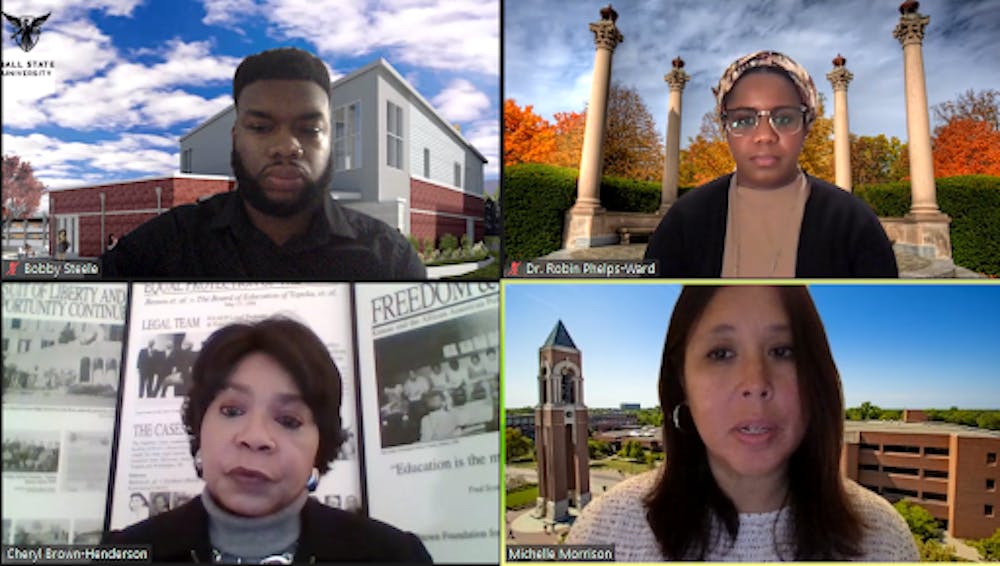Continuing the MLK Speaker Series in a webinar format because of COVID-19 restrictions, Ball State hosted “A Conversation with Cheryl Brown Henderson,” founding president of The Brown Foundation for Educational Equity, Excellence and Research and daughter of Oliver Brown — one of the plaintiffs for Brown v. Board of Education that resulted in the racial desegregation of public schools. Brown Henderson spoke on numerous topics to an online room full of students.
The conversation with Brown Henderson on Feb. 2 was moderated by Bobby Steele, director of the Multicultural Center, and Robin Phelps-Ward, assistant professor of higher education. The Q&A portion of the webinar was moderated by Michelle Morrison, director of academic initiatives and student strategies.
The first topic to come up for the night was about the origins of Brown Henderson’s foundation in 1988.
“One of the Coors brothers [of Coors Brewing Company] had publicly made a racial slur, and he was being called to task by all the various organizations and publications,” Brown Henderson said. “We received a call one day, because we appeared in Life magazine for the 200th anniversary of the Constitution, and they had sought an African-American ad agency to help them undo the damage.”
Coors wanted to use the image from Life Magazine for a campaign in Ebony, Essence and Jet magazines, and Brown Henderson saw an opportunity.
“Our response was, since it was at the time that we were having a conversation about starting some sort of organization, that it would be healthy to help them make their public apology if they helped us begin our organization,” she said.
The purpose of Brown Henderson’s foundation, she said, is to preserve and make sure Brown v. Board of Education continues to resonate with the country.
One of the moderators asked Brown Henderson what she would change about the current climate of the United States to start seeing results immediately.
“Well I would make sure our former president was impeached successfully,” Brown Henderson said. “But honestly, I would really make certain that legislation is on the table to help those that are suffering.”
Brown Henderson said she would also make sure something is done in regards to education.
“I'm one of those people that believes that it's misguided to allow something as important as the secretary of education to be an appointed position,” Brown Henderson said. “It needs to be a senior executive service civil service position so that there's continuity.”
Brown Henderson said whenever someone is appointed as a “political favor” within the education field, teachers and school boards have to “shift gears,” which impacts students' accomplishments.
“Every four to eight years, why do we all of a sudden expect our teachers and children to do something different?” Brown Henderson said. “Learning is learning and education is education. That doesn't change, but we do tinker with it every four to eight years and we should not.”
During the Q&A section of the speaker series, one student asked her for advice or words of wisdom for “young BIPOC (Black, Indigenous, and People of Color) who struggle in spaces that center whiteness.” Brown Henderson said it is important to note that every space centers whiteness and provided her thoughts on white supremacy.
“White supremacy is a lie,” Brown Henderson said, “And we are not to buy into that lie. It hurts my heart that the white parent in our country believes it. Somehow or another they need to wake up. If anybody needs to be woke, they need to be woke about the fact that it’s just not true.”
Brown Henderson concluded her lecture by encouraging attendees to read “The Hill We Climb” by Amanda Gorman, the poem that Gorman recited on President Joe Biden’s Inauguration Day.
Gorman encourages unity and healing for Americans to look toward redemption under the new and future administrations.
"We are striving to forge a union with purpose/ To compose a country committed to all cultures, colors, characters and conditions of man,” Gorman said in her poem.
Brown Henderson said the poem “is compelling, inspirational and strength can be drawn from her words.”
Contact Evan Weaver with comments at erweaver@bsu.edu on Twitter at @evan_weaver7.




